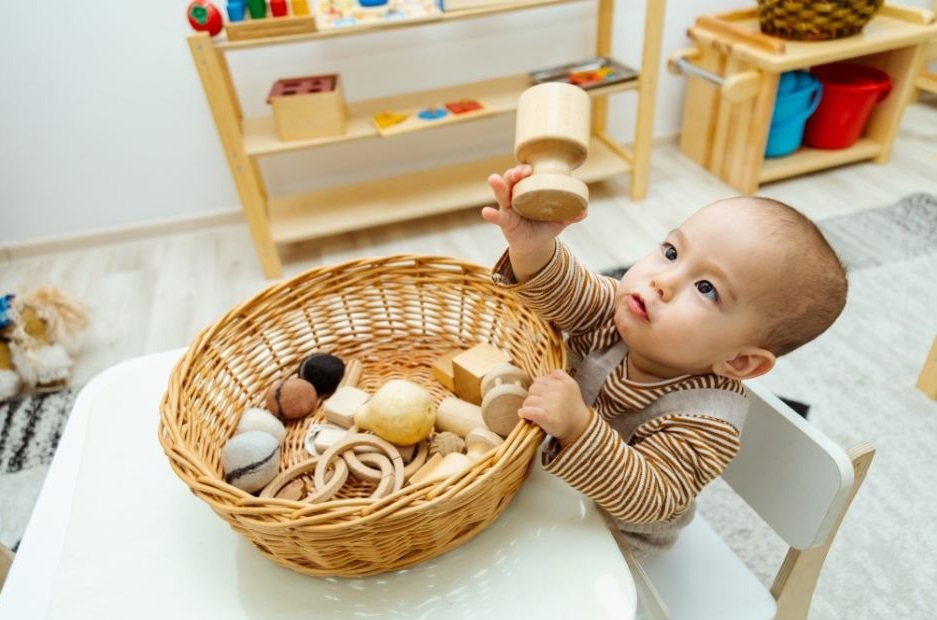Perhaps the most common question Montessori parents have during the holiday season is how to navigate the child’s belief in Santa. You might be wondering, Is my child allowed to believe in Santa if we follow Montessori? How do I keep the magic of the holiday season without the tradition of Santa?
A Look into History
I think it’s important to first examine a bit of history to understand Dr. Montessori’s perspective on this issue. In the early 1900s when she lived, adults often created made-up stories to explain things to children or control unwanted behavior. Dr. Montessori discouraged fantasy or made-up stories as a way to coerce behavior. Not only did she feel that this showed disrespect towards the child, Dr. Montessori discouraged fantasy entirely during the child’s first six years of life.
During this first plane of development, from the ages of birth to 6, the child is building their concept of self and understanding of the world around them; they lack the ability to distinguish between what is real and what is make-believe. They are not yet capable of abstract thought which fantasy is based upon. So if they see a picture of Santa and his reindeer flying through the sky on his sleigh, they will believe this to be reality.
While there’s absolutely nothing wrong with fantasy, Dr. Montessori encouraged that during this time when a child is unable to distinguish between fantasy and reality, this type of make-believe can affect the development of imagination. Although this may seem contradictory, Dr. Montessori encouraged imagination as a way for a child to form new ideas but believed given their fascination and wonder with the world around them, we need only to present reality as it is in order for them to explore their imagination. She states, “The true basis of imagination is reality, and its perception is related to exactness of observation, it is necessary to prepare children to perceive the things in the environment exactly, in order to secure for them the material required by the imagination.”
Based on those ideals, it is assumed that Dr. Montessori would discourage using the story of Santa to manipulate a child’s behavior (whether that be discouraging “bad” behavior or encouraging “good” behavior). She would likely also disagree with the sense of distrust that develops when children find out Santa Claus is not real.
So, what does this mean for you?
Regardless of what the belief in Santa Claus looks like from a Montessori perspective, there’s no right or wrong answer on how families choose to celebrate Christmas and jolly St. Nick. If your family chooses to believe in Santa and practice that tradition with your child, you’re no less “Montessori” and no one is going to shame you for doing so. Sometimes, we can feel such a pressure as parents and caregivers to be perfect or 100% “Montessori” (which, in all honesty, there’s no such thing!) but we also wish to honor and respect our own cultures, traditions and beliefs. It’s a gentle balancing act that each family should navigate on their own, finding what feels like the best fit for them and works for their child. With that being said, if you DO choose to follow a more Montessori approach regarding the belief in Santa Claus, we have some great tips for you!
Encouraging Imagination
Despite these perspectives, you can still encourage a child’s imagination with characters such as Santa Claus, ensuring they know they are not real. You can share stories and participate in the traditions of Santa such as gift giving and eating milk and cookies, knowing that it is you. You can present it to them as a way to “pretend” like they pretend to cook food at their play kitchen, take care of their baby doll, or drive with their toy trucks.
Focusing on Real Life Aspects
Another alternative is to focus on teaching the child the real life aspects and history of the holiday or people like St. Nicholas so they understand the meaning and purpose. Santa Claus himself actually has some fascinating origins, so perhaps you could share facts about this history with your child as well. There are some great children’s books to help you introduce these concepts to children such as:
- Is Santa Real: How St. Nicholas Became Santa Claus by Jackie Jamison
- The Legend of St. Nicholas: A Story of Christmas Giving by Dandi Daley Mackall
- The Wonderful Truth About Santa by B.K. Gendron
- I Got the Christmas Spirit by Connie Schofield-Morrison
Explore the fundamentals of Montessori parenting with this free video by Sylvia Arotin, offering insights and strategies to empower and educate your child.
Some people might argue that not believing in Santa takes the joy out of the holidays, but the season is filled with other wonderful, meaningful traditions. From trimming the tree to singing carols, baking cookies to sending cards, children can participate in just about every aspect of Christmas. Ultimately, you should do what you believe is best for your child and your family. There is no right or wrong answer as to how families choose to portray holidays and the characters tied to them. What’s most important is to enjoy this special time with your child and other loved ones, cherishing the true meaning of the holidays!






